Hosni Mubarak: "I have asked the government to tender its resignation today"
President Hosni Mubarak has defended the role of Egypt's security forces in suppressing anti-government protests which have rocked the country.
Mr Mubarak also dismissed his government and said a new cabinet would be announced on Saturday.
It was his first statement since the protests - in which at least 26 have died with hundreds injured - began.
Tens of thousands took part in protests in Cairo, Suez, Alexandria and other cities.
Protesters set fire to the headquarters of the governing NDP party and besieged state TV and the foreign ministry.
At least 13 people were killed in Suez on Friday, while in Cairo, five people died, according to medical sources.
That brings the death toll to at least 26 since the protests began on Tuesday.
"I have asked the government to present its resignation today," Mr Mubarak said, adding that he would appoint a new government on Saturday.
He also said he understood the protesters' grievances but that a thin line divided liberty from chaos and he would not allow Egypt to be destabilised.
In a televised address shortly after Mr Mubarak spoke, US President Barack Obama said he had spoken at length with the Egyptian president and urged him to turn "a moment of volatility" into "a moment of promise".
“Start Quote
End Quote Barack Obama US PresidentSuppressing ideas never succeeds in making them go away”
The BBC's Jon Leyne in Cairo says there had clearly been a lot of discussion behind the scenes before Mr Mubarak spoke to the country.
But his comments will probably just provoke further unrest, says our correspondent - the people on the streets will be both infuriated by his accusations that they are seeking to destabilise the country and inspired that, having wrung some concessions from him, they could yet manage to oust him.
After Mr Mubarak spoke, a sustained volley was heard from central Cairo, which our correspondent said could have been either tear gas or live fire.
The Reuters news agency later quoted witnesses as saying more than 20 military vehicles rolled in to central Tahrir Square shortly after midnight, scattering protesters into the sidestreets.
'Concrete steps'After days of unrest, protests erupted again on Friday, as tens of thousands of protesters across the country turned out after Friday prayers shouting "Down, down with Mubarak" and, "The people want the regime to fall".
The authorities announced a curfew from 1800 to 0700 local time (1600-0500 GMT), but it was immediately and widely flouted.
At several locations, riot police responded by firing rubber bullets and tear gas, and by using water cannon.
The headquarters of the governing NDP party was set ablaze, while protesters also besieged the state broadcaster and the foreign ministry.
Internet and phone services - both mobile and landline - have been severely disrupted, although protesters are using proxies to work around the restrictions.
The BBC said it would forcefully protest to the Egyptian authorities after a reporter for BBC Arabic, Assad Sawey, arrested and beaten by plainclothes policemen in Cairo.
Mr Obama said he had told Mr Mubarak to respect the rights of the Egyptian people and refrain from using violence against peaceful protesters - but he said the protesters also had a responsibility to express themselves peacefully.
Analysis
Hosni Mubarak looked composed and determined to survive his worst crisis since coming to power 30 years ago.
There was both a carrot and a stick - he acknowledged that the demands of the protesters were legitimate, but accused them of resorting to violence to destabilise Egypt.
Such an accusation is likely to infuriate them, and possibly increase their determination to challenge him even more.
Mr Mubarak defended his record in government, the very thing that is in doubt in the eyes of the hundreds of thousands who have taken to the streets in the past four days.
He promised to continue with democratic reforms, but as far as the opposition is concerned, they have heard it all before. He did make however one big concession: he sacked his entire cabinet. The question is whether this will be enough to calm the protesters or embolden them to ask for more.
He urged the Egyptian leader to take "concrete steps that advance the rights of the Egyptian people" and deliver on the promises of reform in his address.
"Violence will not address the grievances of the Egyptian people. And suppressing ideas never succeeds in making them go away," he said.
"Surely, there will be difficult days to come, but the United States will continue to stand up for the rights of the Egyptian people and work with their government in pursuit of a future that is more just, more free and more hopeful."
The BBC's Paul Adams in Washington said there is no immediate suggestion that the White House is cutting its ties with its long-time ally Mr Mubarak.
But it is clearly giving him the chance to turn the unrest into what Mr Obama described as "a moment of promise", says our correspondent.
Earlier, White House spokesman Robert Gibbs said Washington would review its aid to Egypt based on events in the coming days.
Egypt is the fourth largest recipient of American aid, after Afghanistan, Pakistan and Israel.
Britain, the US and France are all advising against non-essential travel to Egypt.
The unrest follows an uprising in Tunisia two weeks ago, in which President Zine al-Abidine Ben Ali was toppled after 23 years in power.
The Tunisian upheaval began with anger over rising food prices, high unemployment and anger at official corruption - problems which also left many people Egypt feeling frustrated and resentful of their leadership.






 Iron is one of the elements highlighted in the Quran. In the chapter known Al-Hadeed, meaning Iron, we are informed:
Iron is one of the elements highlighted in the Quran. In the chapter known Al-Hadeed, meaning Iron, we are informed: Upon entering the fold of Islam purely for the Pleasure of God, all of one’s previous sins are forgiven, and one starts a new life of piety and righteousness. The Prophet said to a person who had placed the condition upon the Prophet in accepting Islam that God would forgive his sins:
Upon entering the fold of Islam purely for the Pleasure of God, all of one’s previous sins are forgiven, and one starts a new life of piety and righteousness. The Prophet said to a person who had placed the condition upon the Prophet in accepting Islam that God would forgive his sins: Scientists have studied cloud types and have realized that rain clouds are formed and shaped according to definite systems and certain steps connected with certain types of wind and clouds.
Scientists have studied cloud types and have realized that rain clouds are formed and shaped according to definite systems and certain steps connected with certain types of wind and clouds.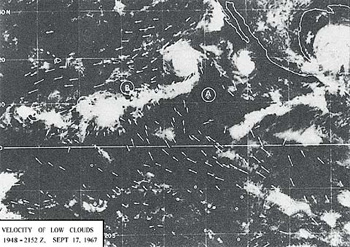

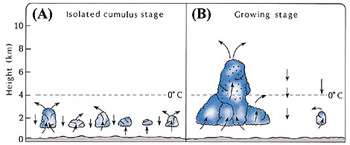
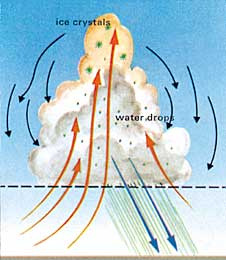

 As liquid droplets collide with a hailstone, they freeze on contact and release latent heat. This keeps the surface of the hailstone warmer than that of the surrounding ice crystals. When the hailstone comes in contact with an ice crystal, an important phenomenon occurs: electrons flow from the colder object toward the warmer object. Hence, the hailstone becomes negatively charged. The same effect occurs when supercooled droplets come in contact with a hailstone and tiny splinters of positively charged ice break off. These lighter positively charged particles are then carried to the upper part of the cloud by updrafts. The hail, left with a negative charge, falls towards the bottom of the cloud, thus the lower part of the cloud becomes negatively charged. These negative charges are then discharged as lightning.
As liquid droplets collide with a hailstone, they freeze on contact and release latent heat. This keeps the surface of the hailstone warmer than that of the surrounding ice crystals. When the hailstone comes in contact with an ice crystal, an important phenomenon occurs: electrons flow from the colder object toward the warmer object. Hence, the hailstone becomes negatively charged. The same effect occurs when supercooled droplets come in contact with a hailstone and tiny splinters of positively charged ice break off. These lighter positively charged particles are then carried to the upper part of the cloud by updrafts. The hail, left with a negative charge, falls towards the bottom of the cloud, thus the lower part of the cloud becomes negatively charged. These negative charges are then discharged as lightning. This verse mentions the darkness found in deep seas and oceans, where if a man stretches out his hand, he cannot see it. The darkness in deep seas and oceans is found around a depth of 200 meters and below. At this depth, there is almost no light (see figure 1). Below a depth of 1000 meters there is no light at all.
This verse mentions the darkness found in deep seas and oceans, where if a man stretches out his hand, he cannot see it. The darkness in deep seas and oceans is found around a depth of 200 meters and below. At this depth, there is almost no light (see figure 1). Below a depth of 1000 meters there is no light at all.

 Modern Science has discovered that in the places where two different seas meet, there is a barrier between them. This barrier divides the two seas so that each sea has its own temperature, salinity, and density.
Modern Science has discovered that in the places where two different seas meet, there is a barrier between them. This barrier divides the two seas so that each sea has its own temperature, salinity, and density.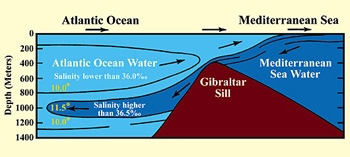

 Why did the Quran describe the front of the head as being lying and sinful? Why didn’t the Quran say that the person was lying and sinful? What is the relationship between the front of the head and lying and sinfulness?
Why did the Quran describe the front of the head as being lying and sinful? Why didn’t the Quran say that the person was lying and sinful? What is the relationship between the front of the head and lying and sinfulness?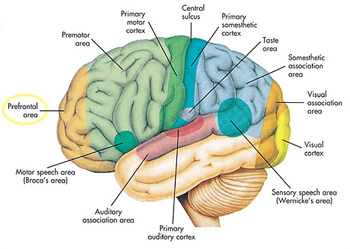
 The science of modern cosmology, observational and theoretical, clearly indicates that, at one point in time, the whole universe was nothing but a cloud of ‘smoke’ (i.e. an opaque highly dense and hot gaseous composition).
The science of modern cosmology, observational and theoretical, clearly indicates that, at one point in time, the whole universe was nothing but a cloud of ‘smoke’ (i.e. an opaque highly dense and hot gaseous composition).

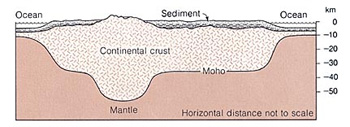
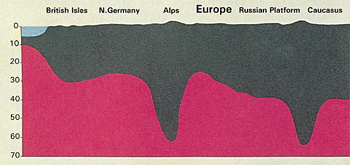

 Could anyone imagine that the solid massive mountain which he sees before him actually extends deep into the earth and has a root, as scientists assert? A large number of books of geology, when discussing mountains, only describe that part which is above the surface of the earth. This is because these books were not written by specialists in geology. However, modern geology has confirmed the truth of the Quranic verses.
Could anyone imagine that the solid massive mountain which he sees before him actually extends deep into the earth and has a root, as scientists assert? A large number of books of geology, when discussing mountains, only describe that part which is above the surface of the earth. This is because these books were not written by specialists in geology. However, modern geology has confirmed the truth of the Quranic verses.










